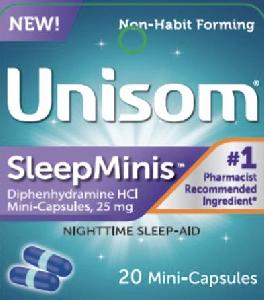Unisom SleepMinis Interactions
There are 450 drugs known to interact with Unisom SleepMinis (diphenhydramine), along with 8 disease interactions, and 1 alcohol/food interaction. Of the total drug interactions, 15 are major, 432 are moderate, and 3 are minor.
- View all 450 medications that may interact with Unisom SleepMinis
- View Unisom SleepMinis alcohol/food interactions (1)
- View Unisom SleepMinis disease interactions (8)
Most frequently checked interactions
View interaction reports for Unisom SleepMinis (diphenhydramine) and the medicines listed below.
- albuterol
- amlodipine
- apple cider vinegar
- ashwaganda
- atenolol
- Augmentin (amoxicillin / clavulanate)
- Caltrate 600+D (calcium / vitamin d)
- Centrum Women 50 Plus Multigummies (multivitamin with minerals)
- chaste tree
- fluticasone
- gabapentin
- Gentle Laxative (bisacodyl)
- hydrochlorothiazide / triamterene
- Lactaid (lactase)
- lamotrigine
- licorice
- losartan
- Lotemax SM (loteprednol ophthalmic)
- Low Dose ASA (aspirin)
- nitrofurantoin
- Omega-3 (omega-3 polyunsaturated fatty acids)
- omeprazole
- One A Day Women's Prenatal (multivitamin, prenatal)
- Probiotic Formula (bifidobacterium infantis / lactobacillus acidophilus)
- progesterone
- rosuvastatin
- selenium
- sertraline
- Symbicort (budesonide / formoterol)
- turmeric
Unisom SleepMinis alcohol/food interactions
There is 1 alcohol/food interaction with Unisom SleepMinis (diphenhydramine).
Unisom SleepMinis disease interactions
There are 8 disease interactions with Unisom SleepMinis (diphenhydramine) which include:
- depression
- anticholinergic effects
- asthma/COPD
- cardiovascular
- renal/liver disease
- glaucoma
- liver disease
- resp depression
More about Unisom SleepMinis (diphenhydramine)
- Compare alternatives
- Drug images
- Latest FDA alerts (2)
- Side effects
- Dosage information
- During pregnancy
- Drug class: anticholinergic antiemetics
- Breastfeeding
Related treatment guides
Drug Interaction Classification
| Highly clinically significant. Avoid combinations; the risk of the interaction outweighs the benefit. | |
| Moderately clinically significant. Usually avoid combinations; use it only under special circumstances. | |
| Minimally clinically significant. Minimize risk; assess risk and consider an alternative drug, take steps to circumvent the interaction risk and/or institute a monitoring plan. | |
| No interaction information available. |
See also:
Further information
Always consult your healthcare provider to ensure the information displayed on this page applies to your personal circumstances.


